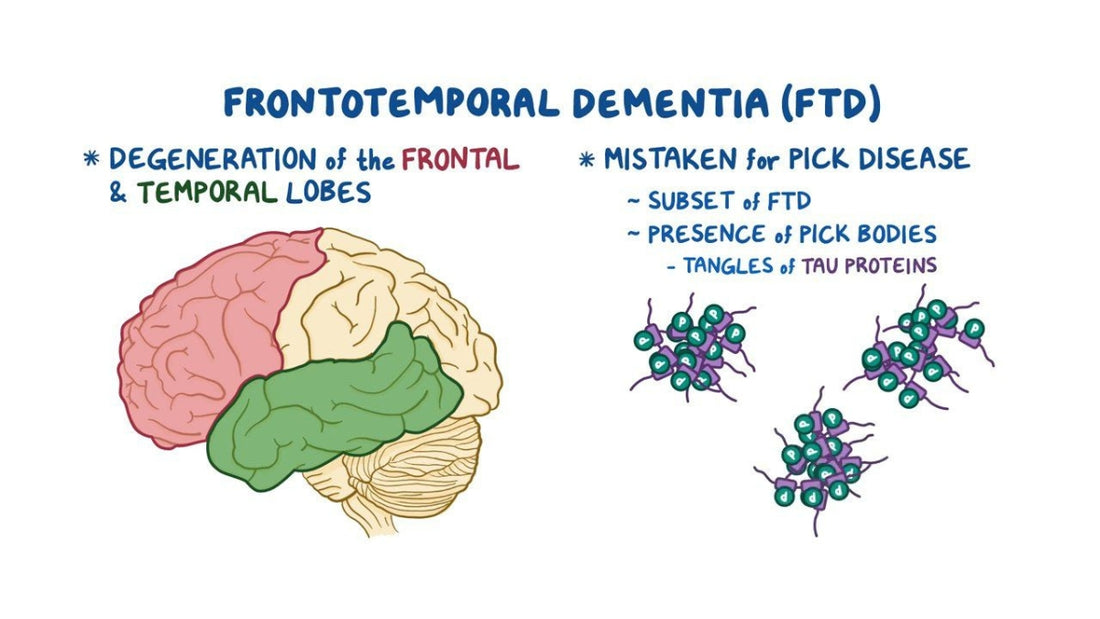
5 Simple Strategies to Help Support Loved Ones Suffering From Frontotemporal Dementia
Medforte AdminShare
Today, we wanted to explore and spotlight frontotemporal dementia (FTD). Join us as we unravel the intricacies of FTD, shedding light on its causes, symptoms, and the challenges it poses for both individuals and their loved ones.
Deciphering Frontotemporal Dementia: The Basics
Frontotemporal dementia, often referred to as FTD, is a group of disorders that primarily affect the frontal and temporal lobes of the brain. These lobes are responsible for personality, behaviour, language, and emotions. Unlike other forms of dementia, FTD tends to strike at a relatively younger age, typically between 40 and 65 years old.
The Complex Causes
Understanding the precise causes of FTD is a puzzle that researchers are diligently working to solve. Some cases are associated with genetic mutations, while others occur spontaneously. The buildup of abnormal proteins in the brain can also contribute to the disease's progression.
Varieties of FTD: A Spectrum of Challenges
Frontotemporal dementia manifests in several distinct ways, each with its own unique set of symptoms:
1. Behavioural Variant FTD (bvFTD): Characterised by changes in behavior, personality, and social interactions. Individuals with bvFTD may exhibit impulsivity, apathy, and lack of empathy.
2. Primary Progressive Aphasia (PPA): Affects language abilities, including speech, comprehension, and word retrieval. Individuals may struggle to express themselves or comprehend conversations.
3. Semantic Dementia: Part of the PPA spectrum, it specifically impacts the understanding of words and their meanings, leading to difficulty in recognising objects and familiar faces.
4. Progressive Supranuclear Palsy (PSP) and Corticobasal Syndrome (CBS): These variants often involve movement difficulties, including problems with balance, coordination, and eye movements.
Navigating the Challenges
Frontotemporal dementia presents unique challenges due to its impact on behaviour and language. As the disease progresses, individuals may display impulsivity, lack of inhibition, and even changes in personal hygiene. Communication challenges can lead to frustration for both the individual and their caregivers.
Support and Coping Strategies
Caring for someone with FTD requires patience, understanding, and a tailored approach:
1. Open Communication: Foster honest conversations about the disease's progression and its impact on daily life.
2. Routine and Structure: Establishing routines can provide a sense of security and predictability.
3. Seeking Professional Help: Consulting neurologists, speech therapists, and support groups can offer valuable guidance.
4. Self-Care for Caregivers: Caring for someone with FTD can be emotionally and physically taxing. Taking breaks and seeking support is essential for caregivers' well-being.
5. Exploring Assistive Tools: Tools such as communication boards and automatic pill dispensers (like ours) can aid daily routines.
Remember that knowledge empowers us to provide compassionate care. By sharing information, support, and resources, we can make a positive impact on the lives of those touched by this complex condition.
Deciphering Frontotemporal Dementia: The Basics
Frontotemporal dementia, often referred to as FTD, is a group of disorders that primarily affect the frontal and temporal lobes of the brain. These lobes are responsible for personality, behaviour, language, and emotions. Unlike other forms of dementia, FTD tends to strike at a relatively younger age, typically between 40 and 65 years old.
The Complex Causes
Understanding the precise causes of FTD is a puzzle that researchers are diligently working to solve. Some cases are associated with genetic mutations, while others occur spontaneously. The buildup of abnormal proteins in the brain can also contribute to the disease's progression.
Varieties of FTD: A Spectrum of Challenges
Frontotemporal dementia manifests in several distinct ways, each with its own unique set of symptoms:
1. Behavioural Variant FTD (bvFTD): Characterised by changes in behavior, personality, and social interactions. Individuals with bvFTD may exhibit impulsivity, apathy, and lack of empathy.
2. Primary Progressive Aphasia (PPA): Affects language abilities, including speech, comprehension, and word retrieval. Individuals may struggle to express themselves or comprehend conversations.
3. Semantic Dementia: Part of the PPA spectrum, it specifically impacts the understanding of words and their meanings, leading to difficulty in recognising objects and familiar faces.
4. Progressive Supranuclear Palsy (PSP) and Corticobasal Syndrome (CBS): These variants often involve movement difficulties, including problems with balance, coordination, and eye movements.
Navigating the Challenges
Frontotemporal dementia presents unique challenges due to its impact on behaviour and language. As the disease progresses, individuals may display impulsivity, lack of inhibition, and even changes in personal hygiene. Communication challenges can lead to frustration for both the individual and their caregivers.
Support and Coping Strategies
Caring for someone with FTD requires patience, understanding, and a tailored approach:
1. Open Communication: Foster honest conversations about the disease's progression and its impact on daily life.
2. Routine and Structure: Establishing routines can provide a sense of security and predictability.
3. Seeking Professional Help: Consulting neurologists, speech therapists, and support groups can offer valuable guidance.
4. Self-Care for Caregivers: Caring for someone with FTD can be emotionally and physically taxing. Taking breaks and seeking support is essential for caregivers' well-being.
5. Exploring Assistive Tools: Tools such as communication boards and automatic pill dispensers (like ours) can aid daily routines.
Remember that knowledge empowers us to provide compassionate care. By sharing information, support, and resources, we can make a positive impact on the lives of those touched by this complex condition.

